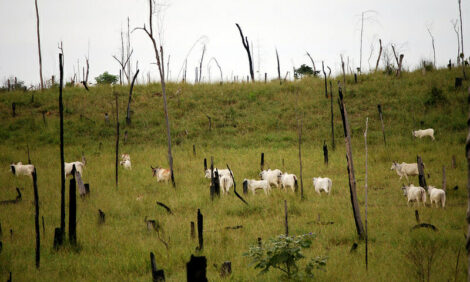



China's Lunar New Year meat sales slow
Shrinking meat consumption ia symptom of economic downturnThe butchers in the Xinfadi wholesale food market, Beijing's largest, slouch on stools behind counters stacked with meat, occasionally looking up from their smartphone videos to call out to the few shoppers idly passing under the market's Lunar New Year decorations, reported Reuters.
"This time last year, this hall would be squeezed so full of people that you could not move,” said a pork seller named Li, who used to sell 20 pigs a day in the holiday run-up but this year is selling just five a day.
The lead up to the Lunar New Year should be Xinfadi's busiest time of year but the sluggish sales reflect the deeper malaise that has settled over the Chinese economy, the world's second-largest. This year, pensive consumers are tightening their belts amid uncertain employment prospects, especially for younger people, a plunging stock market and declining property values.
The holiday, also known as the Spring festival, should see people in the world's largest pork consuming nation stock up as families reunite over feasts including fish, dumplings and cured sausages, but demand this year is lacklustre, ten meat and seafood sellers inside Xinfadi told Reuters.
“It is getting worse year after year. There are fewer people shopping and people are buying less,” said Li, who only gave his surname.
China has struggled to mount a strong post-COVID pandemic recovery, with weak consumer and business confidence, mounting government debt and slowing global growth weighing on jobs, activity and investment.
The International Monetary Fund forecasts China's economic growth to slow to 4.6% in 2024, from 5.2% in 2023, and decline further in the medium term.
"Shrinking meat consumption is a symptom of an economic downturn," said Ma Wenfeng, senior analyst at Beijing Orient Agribusiness Consultancy.
Shanghai-based agro-consultancy JCI pegs China's 2023 pork consumption at between 53 million to 54 million metric tons, lower than its 10-year average of between 54 million to 55 million tons. JCI analyst Rosa Wang said 2024 pork consumption is likely to remain around 54 million tons or lower.
Gro Intelligence predicts China's meat consumption growth will slow in 2024 after increasing by 3.6% in 2023.
“As a result, China's meat import volumes are facing downward pressure,” it said.
Data from the US Department of Agriculture estimates China's pork and chicken consumption in 2024 to decline by 2.5% from a year ago, while beef and veal consumption is seen rising by 1.6%.
Over expansion
Weak demand has put farmers and traders under pressure after aggressive expansion in recent years led to a surplus of pork and poultry, prompting Beijing late last year to buy tens of thousands of tons of pork for its state reserves to lift pork prices.
Wholesaler Jin Tao said narrowing margins have forced several vendors in Xinfadi to shutter.
"Five years ago, this market could sell up to 4,000 hogs a day during Spring Festival. Now, we can't even sell 2,200 heads," Jin said.
Chicken seller Ma Huolu said Spring Festival sales have dropped by 30% from a year ago after restaurant closures hammered wholesale orders. A seafood seller, who declined to be named, said some days she is unable to sell even one fish.
Longer term, China's falling population, down for a second consecutive year in 2023, has raised concerns about demand from the world's top food importer and those repercussions on the global agriculture industries.
Total meat imports have plunged from a peak of 9.91 million tons in 2020 to 7.38 million tons in 2023 amid higher domestic production, according to customs data.
An expanding middle class and an aging population has also meant many health-conscious diners are switching from meat to alternatives such as tofu.
In Xinfadi, Li sighed as he weighed a pork belly slice for a shopper.
"Customers used to buy two or three pieces of belly. Now even the pork ribs are not moving, this is a really difficult year."



